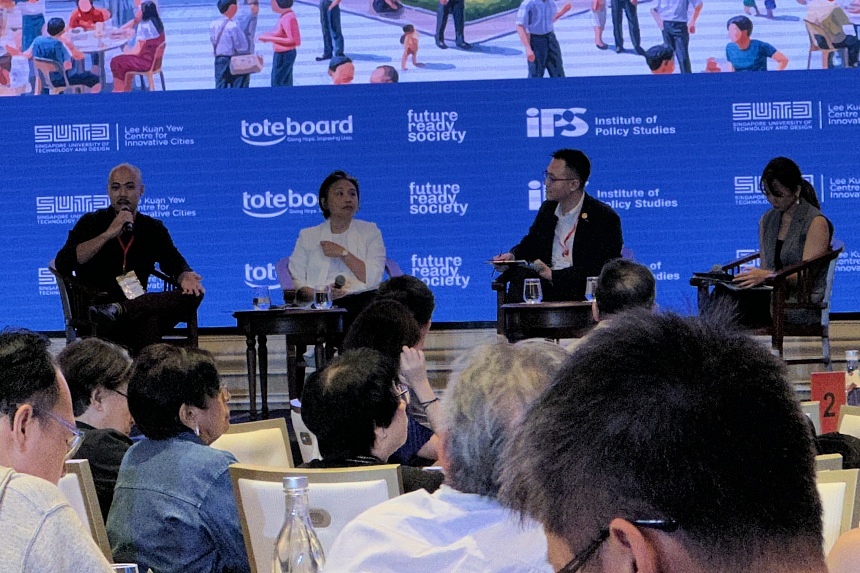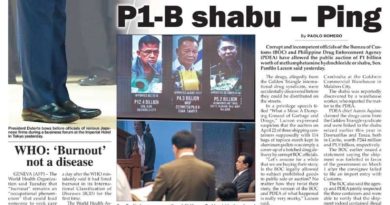ASEANEWS HEADLINE-LIFE+STYE | SINGAPORE: Citizens could get more say in town council budgets under new trial
SINGAPORE – Those who live in public housing have limited influence on how town council funds are used, but this could change. Plans are now being drawn up for a trial allowing residents of one town council – the exact one has not yet been disclosed – to take a more active role in budgeting for community projects.
They could, for instance, vote to build a water play area instead of a conventional playground in the neighbourhood, if the expenditure is justified.
This is known as participatory budgeting, where citizens come together to decide how to spend a given amount of public funds.
Introducing the new framework on Oct 1 was Mr Wee Keng Boon, a general manager at township management company EM Services, which manages nine of Singapore’s 17 town councils.
He was speaking at the Future-Ready Society Conference, where the future of citizen participation was up for debate.
The conference was organised by the Lee Kuan Yew Centre for Innovative Cities and the Institute of Policy Studies (IPS).
Mr Wee declined to provide implementation details, such as when the pilot will begin, as plans are preliminary.
However, he said the amount of public funds allocated for participatory budgeting will be small for a start. One idea being explored is that seven in 10 eligible flat owners in the neighbourhood must support the proposals for them to go through, he added.
This takes reference from the existing Neighbourhood Renewal Programme (NRP), which allows upgrading works to go ahead if they are supported by at least 75 per cent of eligible flat owners, Mr Wee told The Straits Times.
Works under the NRP are fully funded by the Government. They include the building of sheltered linkways, community gardens, fitness corners, drop-off porches and residents’ corners. More than $95 million was set aside in 2024 to fund 23 upgrading projects in Housing Board neighbourhoods.
The new framework is, however, different from the NRP’s mode of public consultation, which seeks feedback on proposed improvements only after designs have been drawn up, Mr Wee said.
“Are there ways we can get residents involved to give us ideas for what they want at the very outset before the design is ready?” Mr Wee asked, before introducing the nine-stage concept of participatory budgeting to his audience.
The aim is for the public to be clued in at an early stage, after the objectives and scope of the neighbourhood improvement are defined by the town council.
Residents can then form committees and take part in activities to get a better idea of the constraints, among other things, before they develop ideas into fuller proposals for other residents to vote on.
The project will be evaluated a few years down the road to account for its long-term effects, and feedback will be collected to learn from the experience.
“After we implement, how heavily is the (feature) used?” Mr Wee said, explaining the importance of evaluation. “Because many times we can say that this idea suits the needs of the residents, but when it is actually implemented, we also do not want it to become a white elephant.”
Making improvements in this way will allow the town council to better allocate resources based on public needs and build stronger connections with residents, Mr Wee said.
Residents could also come to understand the budget better, bond with others and be empowered to initiate projects, he added.
The topic of citizen engagement also came up at an earlier discussion, where Ms Lim Weilin, senior director of engagement at government feedback unit Reach, said the Government’s quality service management e-mail address still gets 2,000 to 3,000 e-mails a month.
This demonstrates that people to want to reach out and hear directly from the Government, she said.
Ms Lim also noted a trend of residents being less receptive to the “typical large-scale engagement, where a minister sits here and tells 200 people what he thinks and closes off”.
“That format is just not working any more, especially as we start to talk about issues that are more sensitive, that affect a diverse range of people,” she said. “Then being able to hear from one another, instead of just the government representative, is very important.”
That is why dialogues with ministers have increasingly taken the format of small group discussions, where people share their thoughts and ministers respond to those views, she added.
One audience member asked what it takes to work with public agencies, which might be cautious and concerned about citizens’ reactions and expectations.
Ms Lim responded that public agencies do welcome and respond positively to feedback that has been given.
Chiming in, Dr Carol Soon, principal research fellow and head of society and culture at the Institute of Policy Studies, a think-tank under NUS, said different agencies come with different appetites and receptiveness.
It is thus important to remind agencies what they want to get out of the engagement, as well as what is at stake, she said.
“We do not want to develop and convene an engagement process where participants walk away feeling that it is wayang… or that they were put through a process that was not egalitarian, and where views were shoved down their neck instead of being solicited,” she added. “Wayang” refers to an act that is done for show.
“Some of these outcomes should be avoided, because it does have long-term impact, not just on the agency’s credibility, but also on the general public’s propensity and enthusiasm to engage in future initiatives,” she said.




 Memento Maxima Digital Marketing
Memento Maxima Digital Marketing Ads by:
Ads by:







